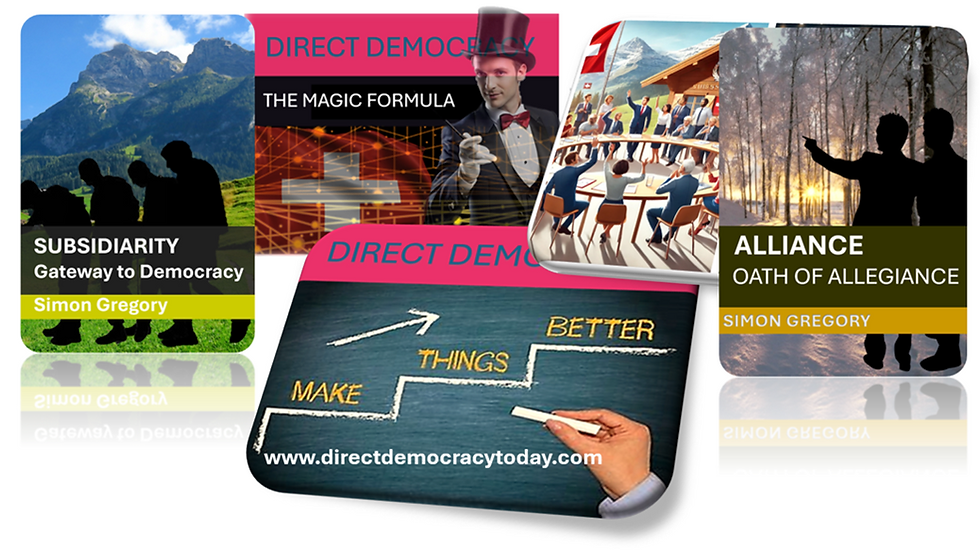Who is Thomas Mercer?
- 5thavenueartist
- Jun 27, 2025
- 3 min read
Thomas Mercer is a British start-up advisor—analytical, entrepreneurial, and comfortably apolitical. Or at least he thought he was. For most of his life, politics had been background noise: a distant, often tedious realm that had little relevance to his day-to-day world of innovation, funding rounds, and product-market fit. A law-abiding citizen and pragmatic optimist, he had always assumed that governance simply worked—imperfect, perhaps, but benign enough to ignore.
That illusion shattered in the 2020s.
Suddenly, and without warning, politics wasn’t something that happened out there—it barged into his life, uninvited and all-consuming. New layers of bureaucratic control disrupted not only his business affairs but his personal freedoms. For the first time, he felt not protected by the system, but surveilled by it. Controlled by it. And bewildered.
How had this happened? And had it always been like this?
A quiet suspicion began to gnaw at him: maybe the problem wasn’t new. Maybe the intrusion had always been there, creeping forward like ivy over stone, while he had simply been too busy, or too trusting, to notice. That realization triggered a transformation—a reluctant awakening. Thomas, the former political bystander, became a seeker of answers.
His work frequently took him to Switzerland, a country he had once admired vaguely for its mountains, chocolate, and watchmaking precision. But now, something deeper caught his attention. As he compared Switzerland’s structure to those of the countries he knew, he noticed something striking: in Switzerland, the people truly governed. Policies were shaped not in distant halls of power but at the kitchen tables of ordinary citizens. Politicians weren’t untouchable elites; they were public servants in the original sense.
It felt like he had stumbled upon a well-kept secret.
Through chance encounters with Hans from the German-speaking region and Pierre from a French-speaking canton, Thomas entered a world of citizens who didn’t just talk about politics—they lived it. What amazed him most was how natural and unpretentious their engagement was. This wasn’t activism. It was culture.
He learned that Switzerland had practiced direct democracy for over 175 years—an entire system built not on hierarchy but on subsidiarity, where power rests at the lowest possible level, with the people themselves.
At first, Thomas was incredulous: why had no one told him? Why did the political systems he had lived in for decades—representative, centralized, insulated—seem designed to obscure the very existence of such a model?
As he began to study this unique structure more closely, he saw the results everywhere: the lowest crime rate in Europe, among the highest life expectancies in the world, unparalleled levels of public trust in government, and an enduring social cohesion that defied modern polarization. Slowly, Thomas realized that these outcomes were no accident. They were the fruit of a system in which people are not ruled but consulted. Where decisions rise from the bottom rather than fall from the top.
His curiosity became obsession.
He began to study the Swiss Confederation’s origins, delving into how its 26 cantons had come together—not through conquest or centralisation, but through voluntary alliance, mutual respect, and local autonomy.
In this confederate structure, Thomas saw the antithesis of the empires and growing superstates he had grown up under, and the antidote to the creeping supranationalism of today. He unearthed stories of resistance—villages that defied foreign overlords, citizens who refused to surrender local power, communities that resisted uniformity in favour of freedom.
Inspired, Thomas set out on a 30-day trek across Switzerland on foot, accompanied by three companions. The journey became both an outer and inner expedition. With each step, he encountered villagers, farmers, teachers, and mayors—people who governed themselves, not because it was trendy or radical, but because it was normal. Along the mountain paths and alpine meadows, Thomas felt something he hadn’t felt in years: hope. Real, tactile hope.
But it wasn’t just nostalgia for an old system. It was a call to action.
The deeper into Switzerland he walked, the clearer the contrast became between this enduring model and the increasingly dystopian trajectory of the digital surveillance states rising elsewhere. He began to see where things were heading globally—toward what he described as a “digital prison,” where centralization, data control, and policy uniformity would replace autonomy, nuance, and freedom. And in that contrast, he saw Switzerland not just as a curiosity—but as a beacon. A template. A resistance.
Thomas Mercer’s journey is chronicled in a four-part series:
Enlightened – A Voyage of Discovery
Grassroots – Dawn of Transformation
Alliance – Oath of Allegiance
Subsidiarity – Gateway to Democracy
Though they can be read in any order, each book follows a different phase of his awakening: from reluctant questioning to revelation, from passive observer to engaged advocate, and ultimately to someone who believes that democracy—true democracy—is not only possible, but worth struggling for.
Thomas Mercer isn’t a hero. He’s you, if you suddenly started asking the questions you were always too busy—or too afraid—to ask.
Available at £12.99 each from AMAZON #DirectDemocracy




Comments